Generative AI is transforming enterprises by enabling innovation, automation, and better decision-making. Businesses can unlock new efficiencies with advanced AI models. Key industries like finance, healthcare, e-commerce, and entertainment are adopting generative AI to drive growth and enhance customer experiences.
A Comparative Look at Leading Generative AI Platforms
Below is an overview of the top generative AI platforms, including their primary use cases and pricing details.
| Platform Name | Use Case | Price |
| OpenAI | Customer support, data insights | Free/Subscription-based |
| Google Cloud AI | Enterprise applications, automation | Pay-as-you-go |
| AiFA Labs | Multimodal AI, enterprise generative AI, autmation | Free trial/Custom pricing |
| Microsoft Azure AI | Productivity tools, enterprise automation | Subscription-based |
| IBM Watsonx.ai | Explainable AI, regulated industries | Custom pricing |
| AWS Bedrock | Multi-model ecosystems, scalability | Pay-as-you-go |
| Anthropic Claude | Ethical AI, customer interactions | Subscription-based |
| Stability AI | Creative generative AI, text-to-image | Custom pricing |
| Cohere | NLP solutions, document analysis | Custom pricing |
| Hugging Face | Open-source AI models, customization | Subscription-based |
Criteria for Evaluating GenAI Platforms
Choosing the right generative AI platform for your enterprise requires careful consideration of key factors to ensure successful implementation and maximum benefit. Generative AI solutions differ in features, scalability, and cost-effectiveness, so it’s essential to assess your specific needs and objectives.
Scalability and Performance
Scalability is crucial for handling the volume of data and user interactions typical in enterprise environments. Assess whether the platform can effectively manage your organization’s current demands while maintaining the flexibility to scale as your business expands.
High-performance platforms ensure uninterrupted service and rapid response times, which are essential for mission-critical operations.
Customization and Fine-Tuning Capabilities
Customization options allow enterprises to tailor AI models to specific business needs. Evaluate whether the platform provides tools for fine-tuning pre-trained models to align with your objectives. This capability can significantly enhance the relevance and effectiveness of AI-generated outputs, making them better suited to industry-specific applications.
Integration with Existing Ecosystems
The ability to seamlessly integrate with your current software, tools, and workflows is a vital consideration. Platforms that offer robust APIs and compatibility with popular enterprise systems can reduce operational overhead and facilitate smoother adoption, enabling teams to leverage AI without disrupting existing processes.
Data Security and Compliance
Data security is a top priority, particularly for industries with stringent regulatory requirements. Ensure the platform adheres to industry standards for data protection and offers robust security measures, such as encryption, secure access controls, and compliance certifications. This safeguards sensitive information and minimizes the risk of breaches.
Cost and ROI Considerations
Understanding the pricing structure and potential return on investment (ROI) is essential for budgeting and decision-making. Analyze whether the platform’s cost is justified by its benefits, such as enhanced efficiency, automation, or revenue generation. Evaluating ROI helps ensure the long-term value of your investment in generative AI technology.
Top Enterprise Generative AI Platforms
The following platforms represent the best options for enterprises seeking to leverage generative AI. Each section provides an overview, key features, and the benefits of using the platform.
1. OpenAI

OpenAI’s generative AI models, including GPT, are among the most advanced in the industry. As pioneers in the development of conversational and text-based AI, OpenAI’s models are designed for enterprise use, offering robust capabilities for generating text, automating tasks, and analyzing data.
These tools are particularly useful in industries where customer interaction and data insights are crucial, such as e-commerce, finance, and content creation. Organizations often leverage OpenAI’s models for strategic decision-making, as well as customer support and marketing.
Key features:
- Highly advanced language models (e.g., GPT-4).
- APIs for seamless integration with enterprise systems.
- Options for fine-tuning models for specific tasks.
Using OpenAI allows businesses to automate workflows, improve customer satisfaction, and gain actionable insights from data.
2. Google Cloud AI
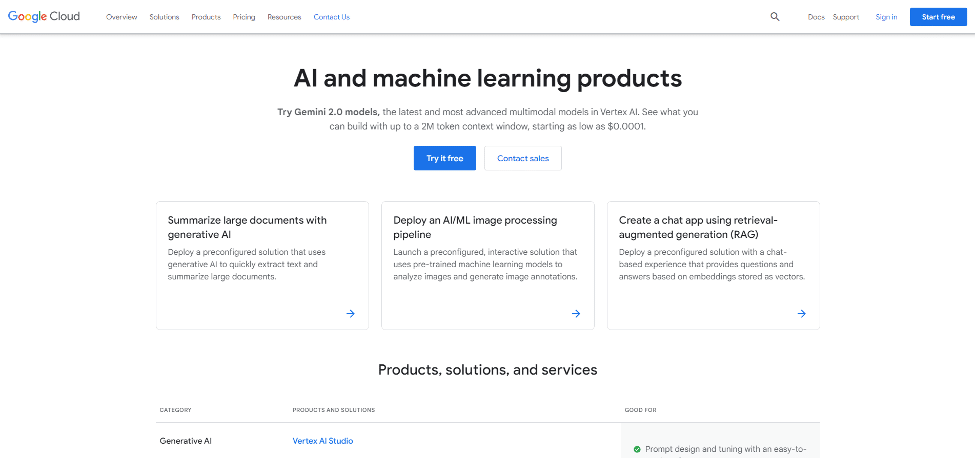
Google’s Vertex AI offers cutting-edge generative capabilities tailored specifically for enterprises. Built on Google’s extensive expertise in machine learning, Vertex AI provides a comprehensive suite of tools for building and deploying machine learning models.
It seamlessly integrates with Google Workspace and other services, empowering businesses to automate processes, enhance analytics, and build innovative AI applications. Vertex AI is ideal for organizations dealing with large-scale datasets and complex workflows.
Key features:
- Robust machine learning tools and pre-trained models.
- Scalability for large datasets and workloads.
- Built-in integration with Google Cloud services.
Leveraging Google Cloud AI enables organizations to accelerate innovation and streamline operations.
3. AiFA Labs

AiFA Labs is a platform dedicated to multimodal and conversational AI solutions. Unlike other platforms, AiFA Labs focuses on democratizing AI technology to make it accessible for businesses of all sizes.
Its multimodal capabilities allow for processing text, image, and speech data simultaneously, making it an excellent choice for industries requiring personalized customer interactions and creative content generation. AiFA Labs also prioritizes ease of use, with user-friendly tools designed for rapid deployment.
Key features:
- Multimodal AI for text, image, and speech processing.
- Tailored solutions for customer service and content generation.
- User-friendly tools for rapid deployment.
AiFA Labs empowers businesses to harness cutting-edge AI technology to boost efficiency and drive growth.
4. Microsoft Azure AI
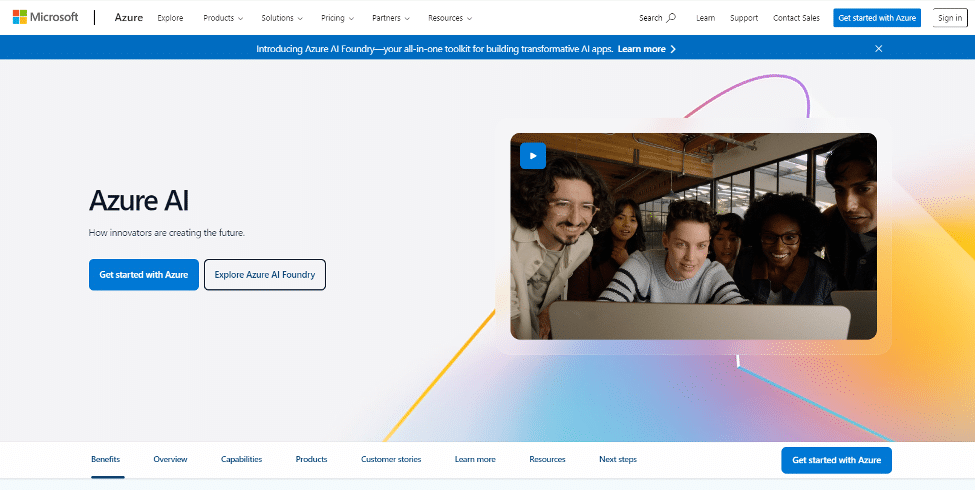
Azure AI integrates OpenAI’s advanced models with Microsoft’s enterprise solutions, creating a robust ecosystem for intelligent application development. Known for its enterprise-grade security, Azure AI is particularly suited for organizations prioritizing data compliance and collaborative efficiency.
The platform’s seamless compatibility with Microsoft Office tools enables businesses to enhance productivity across their workforce while developing scalable AI-driven applications.
Key features:
- Azure OpenAI Service for seamless generative AI integration.
- Enterprise-grade security and compliance.
- Real-world applications in automation and data analysis.
Using Azure AI helps organizations enhance productivity and deliver superior customer experiences.
5. IBM Watsonx.ai
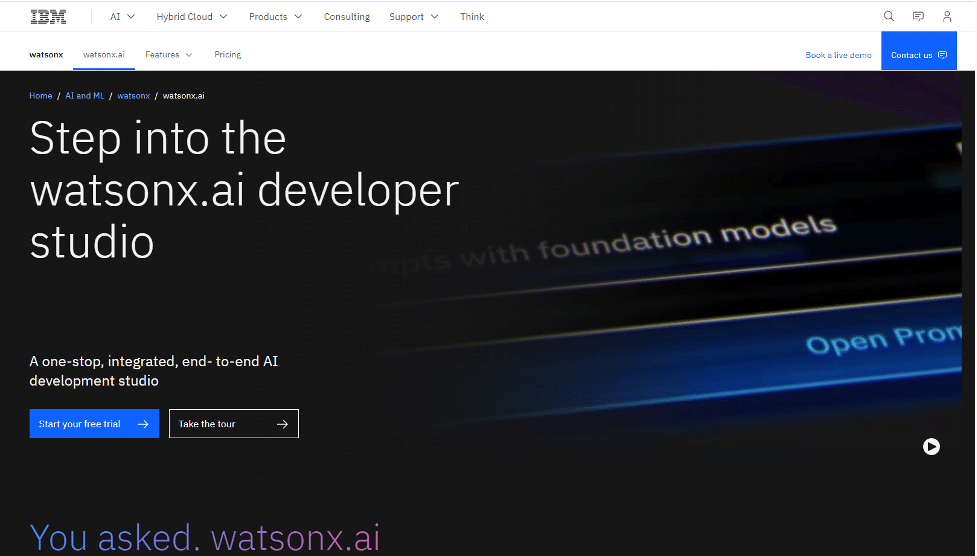
IBM Watsonx.ai is a powerful platform offering explainable and trustworthy AI solutions for enterprises. It is particularly beneficial for organizations in regulated industries, such as healthcare and finance, where compliance and ethical considerations are paramount.
Watsonx.ai’s tools allow businesses to build and deploy generative AI models that adhere to ethical AI practices while providing insights with transparency and accountability.
Key features:
- Tools for building and deploying generative AI models.
- Emphasis on ethical AI practices and explainability.
- Support for large-scale enterprise applications.
IBM Watsonx.ai enables organizations to adopt AI confidently while meeting industry regulations.
6. AWS Bedrock
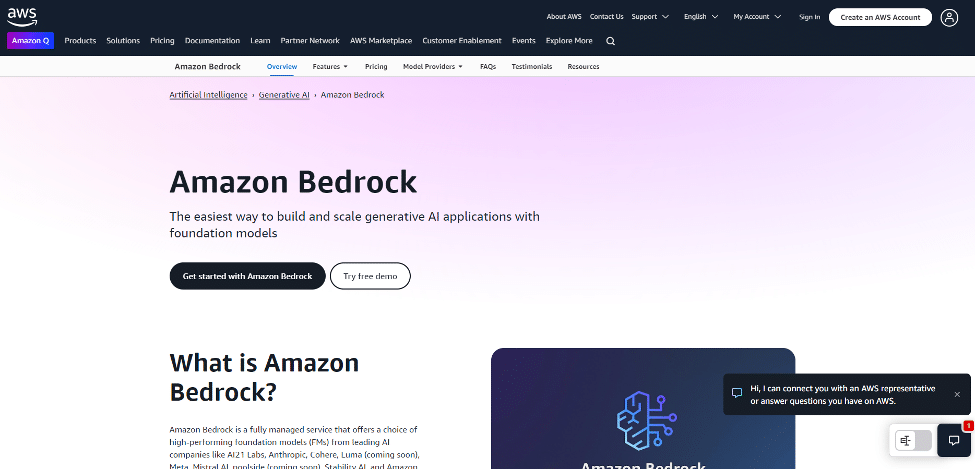
AWS Bedrock provides enterprises with access to a variety of foundational models, including those from leading providers such as Anthropic and Stability AI. This platform is designed to support scalable and secure generative AI applications, with flexible pricing and seamless integration with the AWS ecosystem.
It is a go-to solution for businesses that need reliable, scalable AI solutions to handle complex workloads.
Key features:
- Support for multiple generative AI models.
- Flexible pay-as-you-go pricing.
- Seamless integration with AWS infrastructure.
Adopting AWS Bedrock ensures scalability and reliability for AI-driven innovation.
7. Anthropic Claude
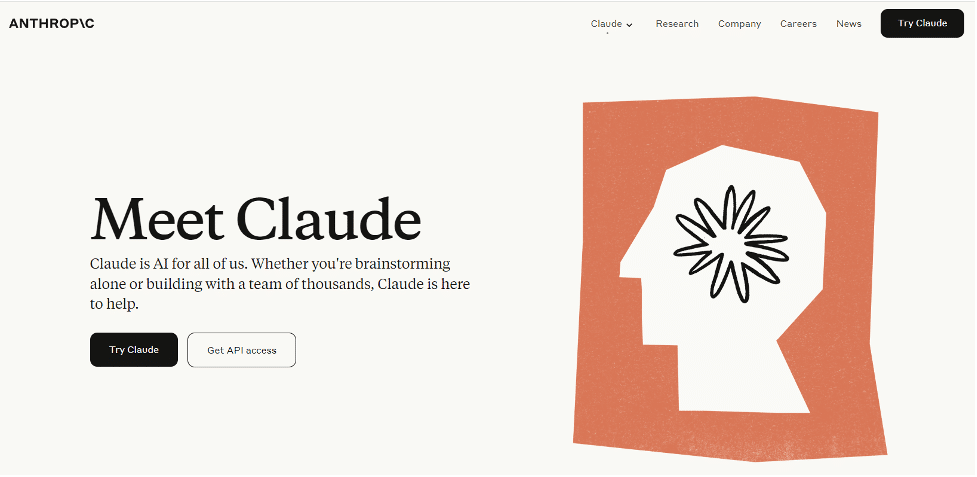
Anthropic’s Claude is an advanced generative AI platform with a strong emphasis on safety and ethical AI. Designed for enterprises focused on customer interactions and process automation, Claude offers reliable conversational AI capabilities while adhering to stringent ethical standards.
This makes it a preferred choice for organizations aiming to build trust through responsible AI practices.
Key features:
- Advanced AI models emphasizing safety and reliability.
- Ideal for conversational AI and automated workflows.
- Compliance with ethical AI standards.
Using Anthropic Claude helps businesses build trust and efficiency through ethical AI solutions.
8. Stability AI
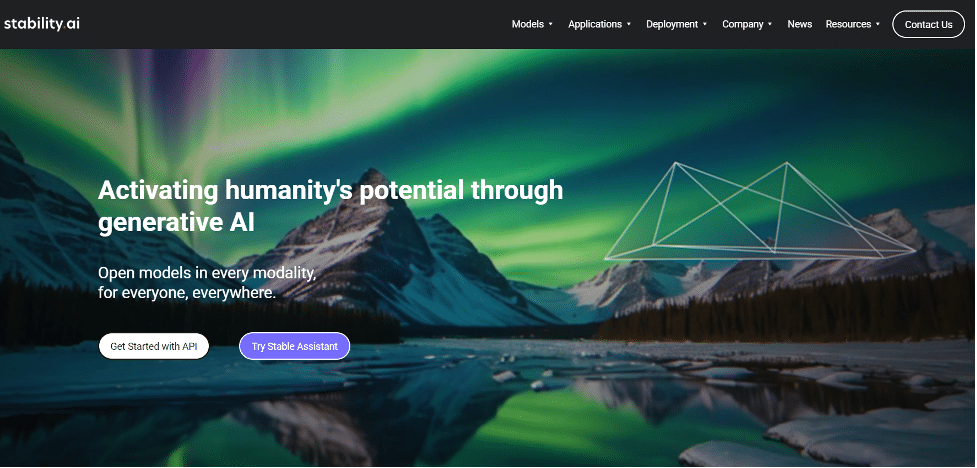
Stability AI stands out for its focus on creative generative AI applications, particularly in the realm of text-to-image generation. The platform’s open-source nature fosters a community-driven approach to innovation, offering enterprises flexibility and cost-effectiveness.
Stability AI is especially valuable for industries like entertainment and marketing, where creativity and customization are key.
Key features:
- Open-source generative AI tools.
- Focus on creative applications and innovation.
- Community-driven development and support.
Stability AI empowers businesses to explore innovative AI solutions while maintaining cost efficiency.
9. Cohere
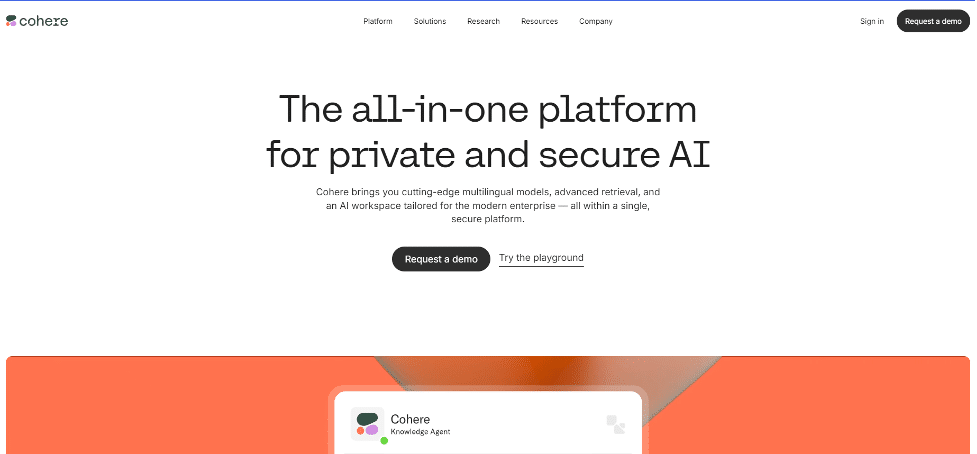
Cohere specializes in advanced natural language processing (NLP) models, providing businesses with tools to enhance text-based processes such as document analysis, summarization, and chatbot development.
Its customizable solutions cater to industry-specific needs, making it a versatile option for enterprises across various sectors.
Key features:
- Advanced NLP models for text analysis.
- Customizable solutions for industry-specific needs.
- Scalable APIs for seamless integration.
Cohere enhances business operations by improving text-based processes and communication.
10. Hugging Face
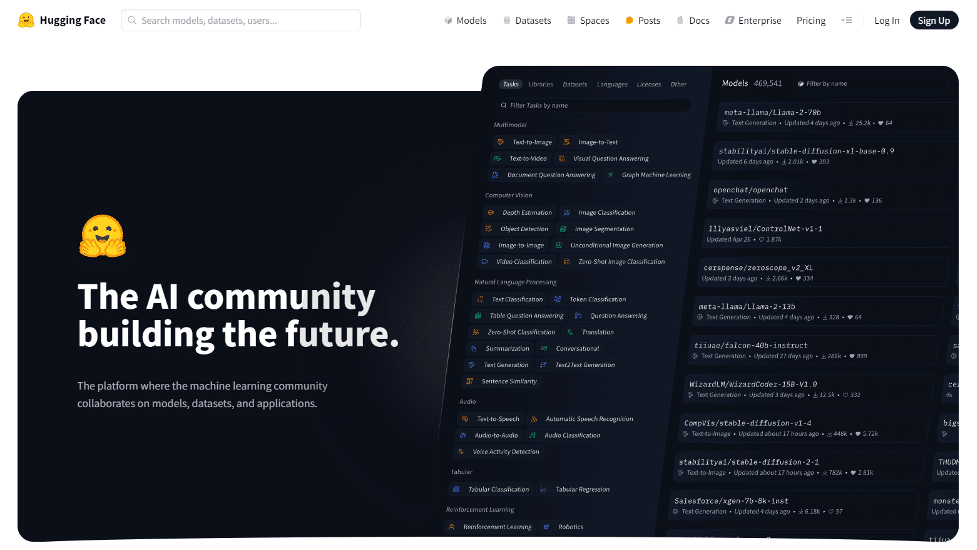
Hugging Face is renowned for its open-source AI models and tools, making it an excellent platform for enterprises seeking customization and flexibility. Hugging Face provides a robust model hub, featuring pre-trained models for various applications, including natural language processing, image recognition, and more.
The platform also offers extensive support for fine-tuning models, allowing businesses to adapt AI capabilities to their unique needs. Its collaborative community fosters innovation and knowledge sharing, making it a favorite among developers and researchers.
Key features:
- Open-source AI model hub with diverse applications.
- Fine-tuning support for tailored enterprise solutions.
- Active community for collaboration and innovation.
Hugging Face empowers organizations to build highly customized AI applications while leveraging open-source flexibility to drive innovation.
Conclusion
Generative AI platforms have changed how businesses innovate and operate. By looking at factors like scalability, integration, and cost, companies can pick the right solutions for their needs. The right platform improves efficiency, sparks creativity, and drives growth, giving businesses a strong advantage in the digital age. Embrace generative AI to unlock your organization’s full potential.
